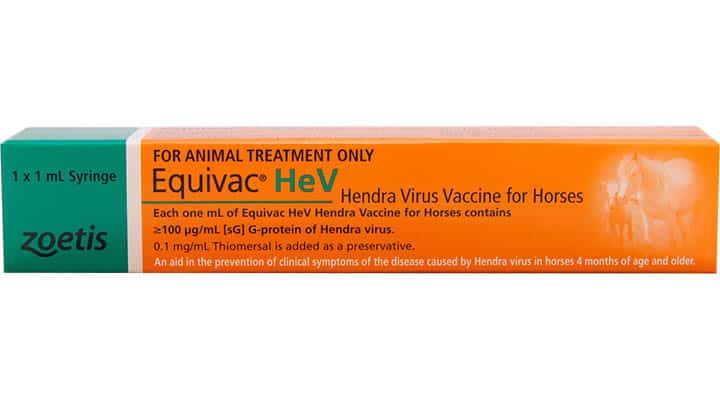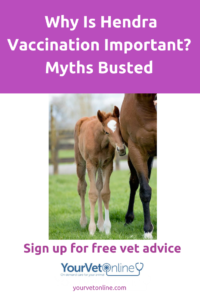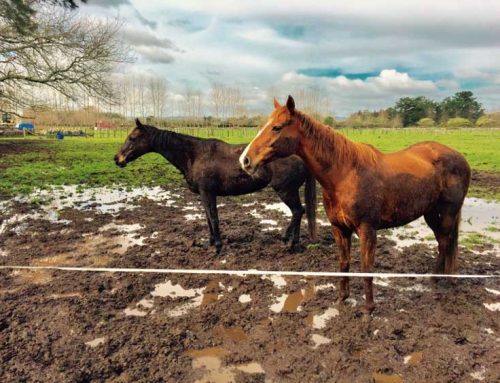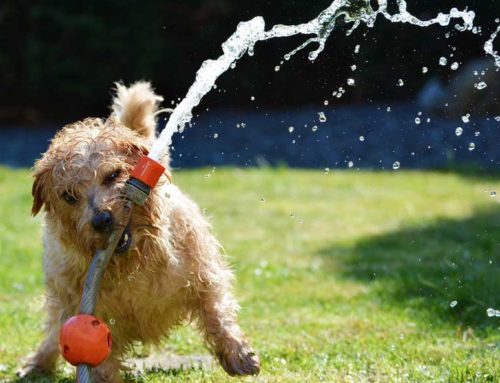Dangers Of Hendra Virus To Humans & Horses
[easy-social-share]
Hendra is a severe, often fatal disease caused by the Hendra virus (HeV) that is spread by the flying fox causing infection in horses.
It is a notifiable zoonotic disease meaning that humans can also become infected and die.
Whilst there is no specific treatment for Hendra Virus, prevention of this disease by vaccination of horses has been extremely successful at preventing its occurrence, with no vaccinated horse succumbing to the virus.
In this article, we explain the lifecycle of the Hendra Virus and how you can keep your horses and yourself safe from this deadly disease.

What Is Hendra Virus?
Hendra virus is a lethal virus that is zoonotic ie. it can affect both animals and people.
It is a member of the henipavirus family and has currently only caused disease in Queensland and Northern New South Wales of Australia, although it is vitally important that we remain vigilant, as the virus has been isolated in the natural host (bats) in other states of Australia.
The natural host Henipaviruses are are fruit bats of the Pteropodidae Family, Pteropus genus.
The virus was first discovered in the suburb of Hendra, Brisbane (hence the name) after seven horses and one person died, although retrospectively it was determined to be the cause of two horse deaths and one human death in Mackay, north of Queensland a month earlier.
How Is Hendra Virus Transmitted Between Animals?
How Hendra virus is transmitted between animals is uncertain.
It is thought that horses may contract the virus by consuming water or food contaminated with saliva or droppings of infected flying foxes.
Spread between horses occurs in situations of close contact where bodily secretions come into contact such as during mutual grooming and eating from the same feed containers.
Transmission to humans can occur through direct contact with body fluids of sick horses, such as nasal secretions or blood products.
The virus can also be spread via respiratory droplets that can travel a distance of up to 5 metres.
This is especially concerning given that horses love to sneeze and shake their head flinging slobber and secretions skyward.
Anyone in close contact with horses such as stable workers, dentists and veterinarians are therefore deemed high risk.
Epidemiological research of human cases to date highlights a concerning fact that human infection likely occurred up to 72 hours before clinical signs in the horse appeared.
At this time there is no evidence of human to human spread, although theoretically, this is possible due to studies showing that henipaviruses can replicate in the epithelial cells of the respiratory tract.
Spread is via aerosol.
Symptoms Of Hendra Virus In Horses
A major concern with diagnosing Hendra virus infection is that the initial onset can look incredibly similar to many other diseases, so how can you know if your horse is a suspected Hendra case?
Put simply, you just can’t.
What’s even more worrying, is that an infected horse can shed the virus for up to 72 hours before showing any significant symptoms.
Initial symptoms can mimic other disorders and diseases such as
Colic: elevated heart rate, rolling, discomfort, lying down, elevated respiratory rate, sweating, ataxia.
Respiratory disease: high temperature, elevated respiratory rate, nasal discharge, sweating.
Other signs that could be present include:
- Muscle spasms and twitching
- Muscle weakness
- Balance difficulties
Owners, handlers and veterinarians must then take extreme caution due to the zoonotic nature of this disease, with limited handling to ensure exposure to the deadly virus is kept to a bare minimum.
Sadly, this means that horses may die waiting for treatment.
What Does Hendra Virus Do?
Hendra can attack either or both the respiratory and neurological systems.
It often results in death.
How Can We Treat Hendra Virus Infection?
There is no treatment for Hendra Virus in horses.
Horses confirmed with Hendra are most often euthanised due to welfare concerns for the horse, biosecurity risk or on request of the owner.
On the occasion that a horse does survive the acute infection, there is no need for these horses to be euthanised.
Horses that recover from infection (PCR negative, antibody positive) are not a transmission risk.
In humans, there is no approved treatment, although an experimental monoclonal antibody treatment is being used to treat those who have been exposed and are at great risk.
The fact remains, Hendra is deadly.
To date, the only method we have to prevent Hendra is to vaccinate horses.
The vaccine works by creating an immune response against the G Protein of the virus.
The G protein is responsible for permitting entry of the Hendra virus into the host cell (horse).
If the G Protein of the virus can be blocked by antibodies formed in response to the vaccine, then the horse cell cannot be infected.
You can tell if a horse has been vaccinated because it will be positive for antibodies against the Hendra virus G protein.
Hendra Vaccination Protocol
Hendra vaccine is the Zoetis vaccine Equivac HeV.

Equivac HeV Hendra vaccination.
Equivac HeV can be given to healthy horses from 4 months of age as an aid in the prevention of disease caused by the Hendra virus.
First Vaccine Injection: Week 0
Second Booster: Week 3-6
Third Booster: 6 months after the second booster
Annual boosters are required.
Safe for use in broodmares.
Reducing The Risk Of Hendra Infection In Horses
Vaccination of horses is the single most effective way to prevent Hendra Virus infection in horses and people.
Flying foxes are the main source of transmission to horses so it makes sense to limit your horse’s exposure to them.
- Consider stabling horses, especially at night.
- Fence off areas where flying foxes roost, especially when trees are fruiting.
- Keep food and water troughs in the open away from roosting areas.

Reducing The Risk Of Human Infection
Vaccination of horses is the single most effective way to prevent Hendra Virus infection in horses and people.
Close contact with horses increases your risk of contracting Hendra virus particularly as a horse can shed the virus without showing symptoms of the disease for up to 72 hours.
Ensure you have a protocol for how to handle all sick horses that includes the use of personal protective equipment (PPE).
Isolate sick horses.
Use good hygiene when handling all horses, particularly the sick.
Wear gloves and wash your hands.
If your horse is sick, avoid handling it unless wearing PPE which includes: disposable gloves, rubber boots, facial shield/glasses, and disposable overalls.
One can NEVER be TOO safe.
Common Questions Asked About Hendra Vaccination
Can broodmares be vaccinated against Hendra?
Yes, broodmares can be vaccinated.
The hendra vaccine has been found to be safe for pregnant mares, however the label precautions against the use during the fist 45 days after mating and the last 14 days before the expected date of foaling.
How Many Boosters Does A Horse Need
The initial course is two vaccinations 2-6 weeks apart then another after 6 months. After this, your horse requires a yearly booster vaccination.
Can You Vaccinate Older Horses?
It is recommended that horses over the age of 4 months old are vaccinated.
However, the label states that it is contraindicated to give EHV to sick or immunocompromised horses.
Often older horses are more susceptible to diseases because of an immune system that is not as robust. While an older horse can be vaccinated, it is best to discuss this with a vet to determine your horse’s needs. Some health conditions may mean that we don’t recommend vaccination and/or we recommend taking other precautions at the time. eg. horses with known or suspected Cushing’s Disease.
Is Titre Testing Available?
Currently, while titre tests are available, there has been no research into determining how long immunity lasts. That means that if we titre test today and a horse has a high titre, we have no idea whether that horse will still have a high titre in a month’s time.
It takes many years and many titre tests of 100000s of 1000s of animals to generate enough knowledge to make a standalone decision on titre testing.
What Are The Most Common Adverse Reactions?
The most frequent adverse reactions noted after Hendra vaccination include:
-
- injection site reactions,
- pain ,
- oedema,
- lethargy,
- anorexia.
- injection site reactions,
A complete list can be viewed on the APVMA website.
Can Dogs Get Hendra?
There is currently no evidence to suggest that dogs can become infected with Hendra via Flying Foxes.
They can, however, become infected from contact with a Hendra-infected horse.
How Long Does Hendra Last In The Environment?
It is likely that Hendra only lasts a couple of hours in normal circumstances. When all environmental conditions are perfect, it may be possible to last up to a week.
Do you have questions about Hendra Virus or Hendra vaccination for your horse? Get in touch with us here for a confidential, one-on-one discussion with one of our qualified veterinarians.





Leave A Comment